Zmitser Bandarenka: Belarus to Become the Stumbling Block for Putin
- 12.11.2018, 16:15
- 15,287
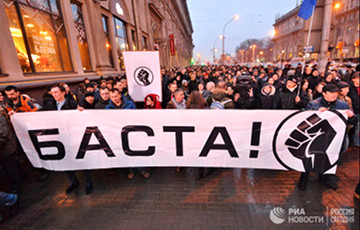
There was a good reason for the agreement of the collapse of the Soviet Union signed in the Belarusian Bialowieza forest.
In its November issue well-known Polish magazine 'Karta' wrote about the 20th anniversary of the Belarusian civil initiative and 'Charter-97'. The magazine published memoirs of initiative's coordinators Andrei Sannikov and Zmitser Bandarenka, and editor-in-chief of Charter97.org Natallia Radzina.
Earlier we published memoirs of Andrei Sannikov.
Today Charter97.org presents the story of Zmitser Bandarenka, the coordinator of the initiative 'Charter-97' and the author of mass protests in Belarus:
- In late 1980s - early 1990s Belarus had its national-liberation revolution. As a result, the country became independent. As other countries of the Eastern Europe, it related to "Gorbachev's Perestroika", but had some peculiarities. It was also my personal revolution, because I used to be a Soviet person - in social, political, and national sense. Changes happened both in Belarus and in me.
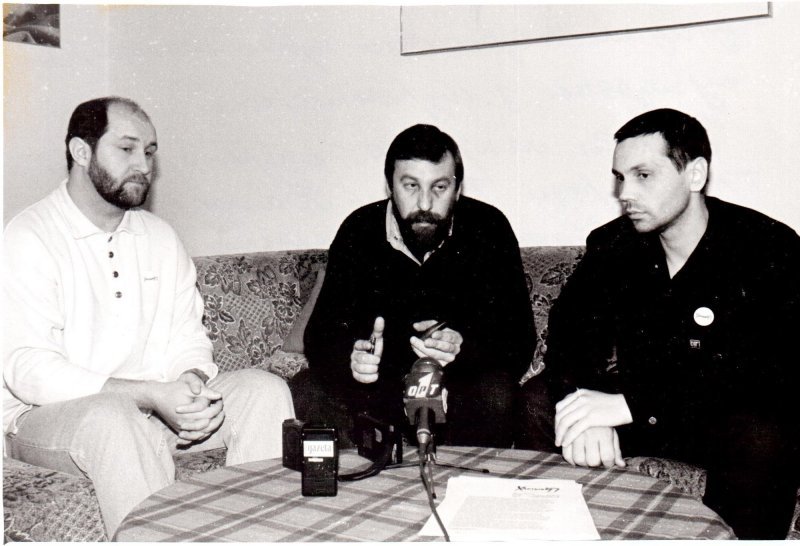
Then I participated in mass events, read lots of literature earlier banned. Later I became business director of the only Belarusian-speaking independent radio station 'Radio 101.2' in Minsk. Lukashenka closed it in 1996. Then I realized no business could be run in Belarus. The situation required changes.
In 1997 journalists of Russian ORT TV channel Dmitry Zavadsky and Pavel Sheremet were arrested in Belarus. Then I headed the MVF and we fought for their release. We organized March of journalists wearing striped work clothes. It was a true world-wide journalistic solidarity, because the death of Prinsess Diana was on agenda then.
In 1997 repressions against the journalistic community were intensified. Radio 101.2, all regional independent studios, newspapers were closed within a year. Repressions against rock musicians were the impetus for Czechoslovakian Charter'77. In Belarus repressions against the journalistic community served as the impetus. Journalists became the factor for initiation of 'Charter'97'.
It was absolutely clear that rights needed defence. For almost 10 years we felt free and did not want to give up it.
Later the organizing committee of the initiative Charter'97 was established. Passed-away Viktar Ivashkevich was one of its members. He was an icon of the Belarusian People's Front, an organizer of many actions in late 1980s - early 1990s. I was very entertained to work with him. I learned a lot from him.
Right to protest is unalienable. I was shocked to learn about more than 700 protest actions held every year in Warsaw. People stand for their opinion on rallies, pickets, demonstrations. The power should listen to people, change laws, seek new ways and move forward. But the dictatorial regimes ignore these interests, do their best to restrain people's activity, undervalue them, make them obedient. All this undermines our future in the form of a social upheaval. Belarusian practiced various kinds of protests and payed a high price for it.
Since 1998 almost all protest actions of Belarus have been organized by the organizing committee of 'Charter-97' along with other democratic forces. Mikalai Khalezin, Aleh Bebenin, Viktar Ivashkevich and I were often involved in the organization. Protest actions were bright and catchy: Freedom Marches, "For Better Life" March, "No More Life Like This!", protests against the election fraud in 2001, 2006, 2010 in Minsk. We also organized lots of pickets, small authorized and unauthorized solidarity actions demanding the release of political prisoners, carried out campaigns to support families of kidnapped and killed opposition leaders. We held Belarusian Solidarity Day on 16th day of every month.
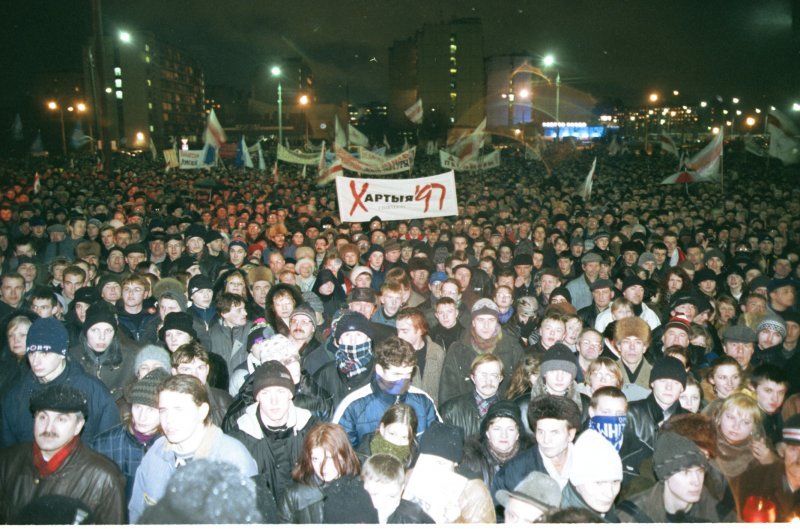
We invented the mechanism of the collective security system when every victim of the regime regardless of political views could rely on our support. Every repressed person had a lawyer and legal support, every arrest was immediately covered by Charter97.org and other independent media of Belarus.
I faced 8 administrative arrests, a number of administrative trials, and several criminal cases. When I was jailed, I realized that our system worked.
Belarus is the authoritarian regime of the Latin America style. We know that the number of the kidnapped and killed amounts at dozens of thousands of people.
Fighters for freedom from Central and Eastern Europe, Poland, the Czech Republic and Slovakia, dissidents of the USSR served as an example. Open borders let us learn from leaders of the Czechoslovakian 'Charter'77'. Several times I was in groups of the Belarusian opposition which visited the Czech Republic and Slovakia. I was really impressed by the conversation with Jan Urban, one of the leaders of Charter'77 and the Civil Forum. I was impressed by his statement that he would head the Civil Forum (the leading political force of the Czech Republic during the Velvet Revolution) unless free elections in the country. Later he retired from politics and got involved in journalism.
In our turn, we shared our experience with Serbs, Ukrainians, Georgians before and after revolutions in their countries. I remember the time during the Orange Revolution in Kiev: we were standing on the square and people from Giorgia, Azerbaijan, Serbia, Ukraine and Russia were next to us.
In 2000 Zubr youth movement was created. Several leaders came to me and said they wanted to create a new movement. They knew me as a speacilist in marketing, and we participated in protest actions together. Our team (now it is known as political consulting) discussed the idea. It involved journalists, advertising experts, marketing professional who had experience in leading mass media sources, companies, advertising agencies.
That's the story of Zubr. It was mass youth movement. We were standing beyond its origins. Of course, it was the youth movement which included people of older age. I took the oath of Zubr.
I used to hear abroad that Belarusians did not resist and did nothing. But these people are not informed or do not want to be informed. Belarusians have many things to be proud of. I mean first and second Freedom Marches with 30-50 thousand people involved. I mean Squares - protest actions against the election fraud in 2006 and 2010, and many other actions.
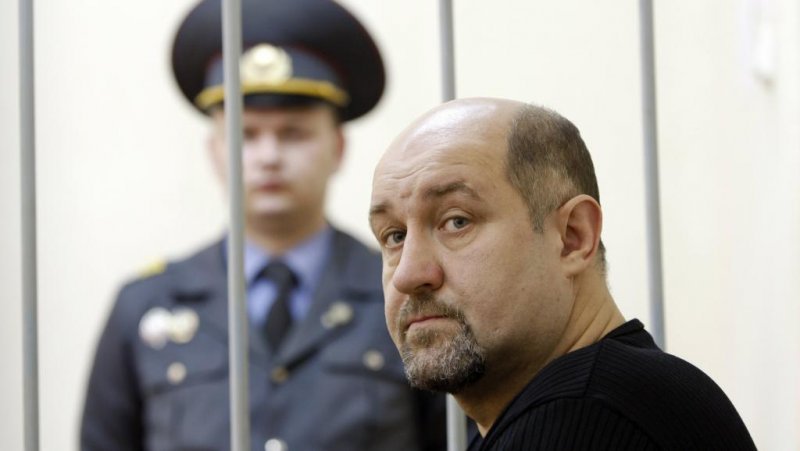
Our team realized that only physical presence of people who actively stand for their rights on the streets could make a difference. We also knew about consequences: we could be jailed, killed, repressed.
Dozens of thousands of Belarusians were jailed, subjected to administrative arrests; hundreds of Belarusians experienced tortures in prisons. Dozens of thousands of Belarusians were deprived of their right to education, expelled from universities, fired, or had to leave the country because of their views.
In 2001 I headed Sannikov's election campaign. I believe that my colleagues from Zubr and Charter-97 were lucky to meet this person. His moral and intellectual bar gave us an impetus for further growth.
It was earlier considered that the Charter was aimed to help political structures, but we did not strive for a political leadership. However, the experience of presidential campaigns of 2006 and 2010 showed that many things depended on an opposition candidate. We faced such pseudo-candidates as Uladzimir Hancharyk and Aliaksandr Milinkevich. That's why we, especially the young, persuaded Andrei Sannikov to run for the presidency in 2010. and we could prepare the Square with our own candidate.
It was a hard decision for Andrei. He realized his responsibility and consequences his activity could bear. At the same time, there were a lot of chastened people of all ages. They believed Sannikov and wanted to join his team.
It was a great challenge for us to learn about the murder of our friend and founder of Charter'97 Aleh Bebenin several days before the election campaign. We knew it was a warning, but we decided to move on.
Many protocols we received from the election points showed that Andrei Sannikov made it to the second round of the elections. If we ignore a forced early voting, he definitely won the elections in Minsk. In early 2011 four Ministers of Foreign Affairs of Poland, Germany, the Czech Republic and Sweden published an article in New York Times. They stated that Lukashenka lost the elections and the second round had to be held. The article was "Lukashenka Is Loser".
In December 2010 Lukashenka was scared to death. More than a thousand people were arrested. I was also arrested and placed in the KGB prison. In the jail we were forced to watch the "swearing-in ceremony" of Lukashenka.
8 of 10 presidential candidates and members of their teams were behind bars. I thought that "Everything's fine. Members of Charter'77, Solidarity leaders were also behind bars. We are just lagging behind a bit and it's just other step forward."
Over the past 100 years the Belarusian prison has held few changes. The only difference is electricity. For example, more than a month I spent in the basement-type ward with 35 people in it, instead of 17 it was designed for. It's the modern GULAG, though with no mass executions. I witnessed several death cases and I know that many people who were in jail with me passed away either at once or several years after the release.
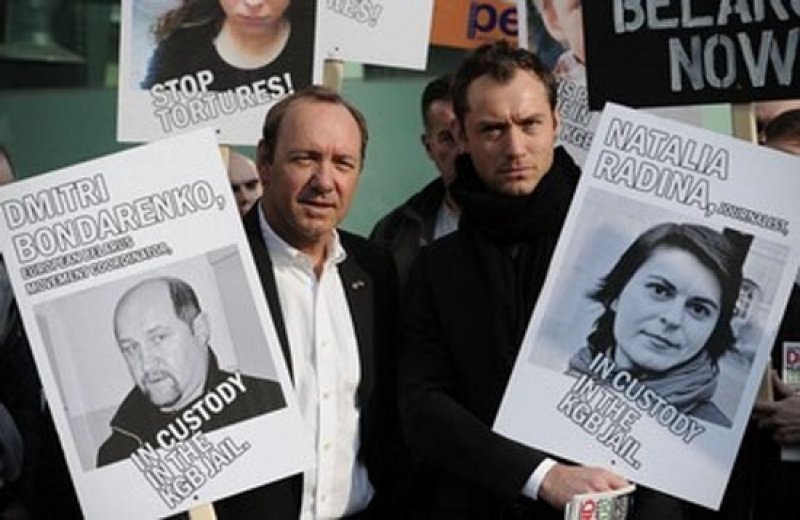
The prison experience became the moment of truth to me. When I spent 10 days in the KGB isolation ward I asked myself: "Why do I do this?". Then I came up with three determining words: "God, Belarus, Family". This is what I am living and fighting for.
Out imprisonment was a hard test of our principles we laid as foundation for our 'Charter'. These principles work and both the Belarusian and international solidarity with political prisoners prove this. Belarusians showed their best during that time. This is a bright page in the history of Belarus. Support of Belarusians, our friends and colleagues abroad was something incredible.
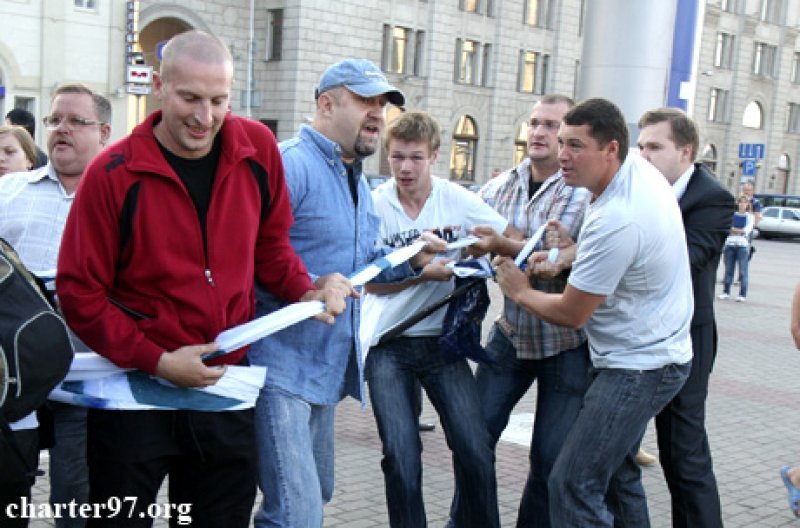
I had to migrate after the release. When we were released and interviewed with Andrei Sannikov for the first time, Lukashenka was in panic and he directly stated that we would be back to prison soon, if we did not silence. When we were leaving for Lithuania to be treated, we were demonstratively taken off the train, searched and threatened. We made a difficult decision to leave the country then.
We still pursue our mission. We will not be able to sit still unless our objectives are reached. Our life abroad is the continuation of our assistance mission to Belarusians who fight in Belarus. We use new levers to retain independence of Belarus so that it could become a free country and a member of the European Union. These are our objectives.
We can see events in Russia, Belarus, the Crimea, and the Donbass.
To keep this resistance active, we need people both within the country and abroad. Belarusian media abroad, as well as a number of political structures and leaders also indicate independence of Belarus, because the very Russia knows about people who will never stand the occupation of the country.
Our objective is clear: to help people in the country and provide the dissemination of information.
The collapse of "empire evil" is on. There was a good reason for the agreement of the collapse of the Soviet Union signed in the Belarusian Bialowieza forest. I believe that Belarus will become a stumbling block for the Putin dictatorship. All people want to be free.










